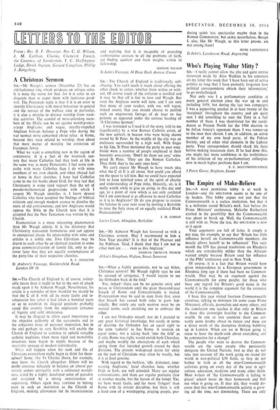A Christmas Sermon
- L -1 L_ J L _.1 ....= - -E -
-Lr JL From : Rev R. F. Dossetor, Rev C. G. 14/ ilson, 1. M. Cobban, Charles Chenevix Trench, the Countess of Lauderdale, T. C. Skeffington- Lodge, Derek Ingram, Gerard Coughlan, Phillip T. Bangs berg.
SIR.—Mr Waugh's sermon (December 23) has an old-fashioned ring which produces an antique echo. It is none the worse for that, for it is safer to air disquiets than to paper them with factitious good- will. The Protestant reply is that if it is an error to identify Christianity with moral behaviour in general and the service of the welfare state in particular, it is also a mistake to divorce worship from week- day activities. The scandal of mass-attending mem- bers of the Mafia can be set against worship-once- a-year Anglicans; and vague, royalty-stupefied Anglican bishops balance a Pope who during the war seemed more concerned about relics in Rome, because they were related to worship, than about that mere matter of morality the extinction of European Jewry.
What we want is something new in the region of controversy. It is a fact of the twentieth cen- tury that many Catholics feel they look at life in the same way as many Protestants. I feel more sym- pathy with many Catholics than I do with some members of my own church, and when abroad feel at home in their churches. I have had Catholics come to me for books about God, for they feel that Christianity is wider (and vaguer) than the set of pseudo-mathematical propositions with which I suspect Mr Waugh identifies it. l know devout Catholics who have accepted the findings of biblical criticism and enough modern science to dissolve the roots of old controversies; and few Anglicans would oppose the Bible to the Church now that it is accepted that the New Testament was written by the Church.
Ecumenicism is a more interesting phenomenon than Mr Waugh admits. It is the discovery that Christianity transcends formularies and can appear in unexpected places. Its relationship with rules and articles is a subtle one. Two Christians may be drawn to each other by an identical reaction to some gross commercialisation of family life, only to dis- cover later that they are equally contemptuous of the party-line of their respective churches.
London SW 16






































 Previous page
Previous page